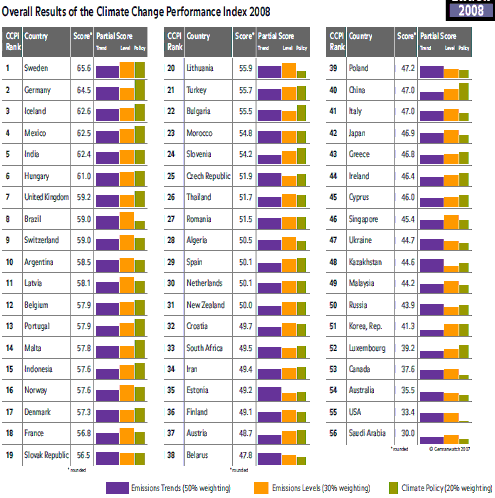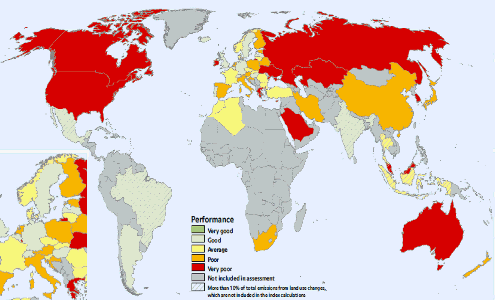The NGO Germanwatch has just released its annual Climate Change Performance Index comparing the progress of the world's top 56 carbon emitting nations on the criteria of emissions trends, emissions levels, and climate policy. To no one's surprise, the country led by PetroBush Jr. and the Exxonites finished 55th out of 56 countries. The USA's score is particularly hard hit in the area of climate policy, undoubtedly due to obstructionism on the matter in international fora (see article below) and climate change obfuscation back home. Isolated by Australia's decision to sign on to the Kyoto Protocol, America is the only developed country to go it alone on the matter. Here is the relevant table:

 Hopefully, more enlightened American leadership is forthcoming in the 2008 elections. Meanwhile, Bush's callous "who cares if your dumb island country sinks into the ocean"-type attitude continues at the ongoing UN-sponsored Bali conference on climate change to the chagrin of many. Like with many other things, the Bush administration has its priorities messed up. Most probably, the biggest threat to the planet's well-being is not someone hiding in a cave in Afghanistan or Pakistan but the prospect of global warming. Anyway, here is the Associated Press on the US representatives at Bali calling for voluntary, non-binding, and likely non-consequential action on climate change:
Hopefully, more enlightened American leadership is forthcoming in the 2008 elections. Meanwhile, Bush's callous "who cares if your dumb island country sinks into the ocean"-type attitude continues at the ongoing UN-sponsored Bali conference on climate change to the chagrin of many. Like with many other things, the Bush administration has its priorities messed up. Most probably, the biggest threat to the planet's well-being is not someone hiding in a cave in Afghanistan or Pakistan but the prospect of global warming. Anyway, here is the Associated Press on the US representatives at Bali calling for voluntary, non-binding, and likely non-consequential action on climate change:The United States will come up with its own plan to cut global-warming gases by mid-2008, and won't commit to mandatory caps at the U.N. climate conference here, the chief U.S. negotiator said Saturday. "We're not ready to do that here," said Harlan Watson, the State Department's senior climate negotiator and special representative. [Translation: The world can go suck an egg.] "We're working on that, what our domestic contribution would be, and again we expect that sometime before the end of the Major Economies process." That process of U.S.-led talks was inaugurated last September by President Bush, who invited 16 other "major economies" such as the Europeans, Japan, China and India, to Washington to discuss a future international program of cutbacks in carbon dioxide and other emissions blamed for global warming.
Environmentalists accuse the Bush administration of using those parallel talks to subvert the long-running U.N. negotiations and the spirit of the binding Kyoto Protocol, which requires 36 industrial nations to make relatively modest cuts in "greenhouse" gases. The United States is the only major industrial country to have rejected Kyoto and its obligatory targets. The U.S. leadership instead favors a more voluntary approach, in which individual nations determine what they can contribute to a global effort, without taking on obligations under the U.N. climate treaty.
Watson's comments reaffirmed that the Bush administration views its own talks as the main event in discussions over climate change. The European Union, on the other hand, has committed to binding emissions reductions of 20 percent by 2020. Midway through the two-week Bali conference, many of the more than 180 assembled nations were demanding such firm commitments from Washington as well, as the world talks about a framework to follow Kyoto when it expires in 2012.
"It would be useful for Annex I, non-Kyoto countries" — code for the U.S. — "to indicate what level of effort" they'll make, said M.J. Mace, a delegate from the Pacific nation of Micronesia, whose islands are threatened by seas rising from global warming.
The conference's main negotiating text, tabled for debate on Saturday and obtained by The Associated Press, mentions targets, but in a nonbinding way. Its preamble notes the widely accepted view that industrial nations' emissions should be cut by 25-40 percent below 1990 levels by 2020 to help head off climate change's worst impacts — expanding oceans, spreading droughts, dying species, extreme weather and other effects. Even mentioning such numbers in the conference's key document may set off renewed debate next week, when environment ministers and other ranking leaders join the talks, which are meant to launch a two-year negotiation for a post-Kyoto deal...
American negotiator Watson said the Bush administration is planning probably four more meetings in the Major Economies series before a "leaders' meeting" in mid-2008 presents a final outcome...as Bush's White House term nears its end, the rest of the world may be looking instead for a fresh start under a new president less resistant to binding international cooperation. Democratic and some Republican presidential hopefuls favor mandatory reductions. The U.N.'s De Boer, in fact, implied that the world ought to wait before debating binding targets.
"I really hope that that is a discussion that will be taken up toward the end of that two years rather than here," he told reporters. The talks to follow Bali would also attempt to draw China, Brazil and other fast-developing economies — all exempted from binding reductions under Kyoto — into some arrangement whereby they would slow growth in their emissions.
Wait for Bush to go--it's a waiting game just as it was with the demise of that other enviro-fiend John Howard in Australia. In the meantime, this map of climate change performance should be informative. Note the diagonally shaded areas though because carbon emissions due to "land use changes" (that's deforestation to you and me) were not considered in index calculations. The inset is of Western Europe, of course:


